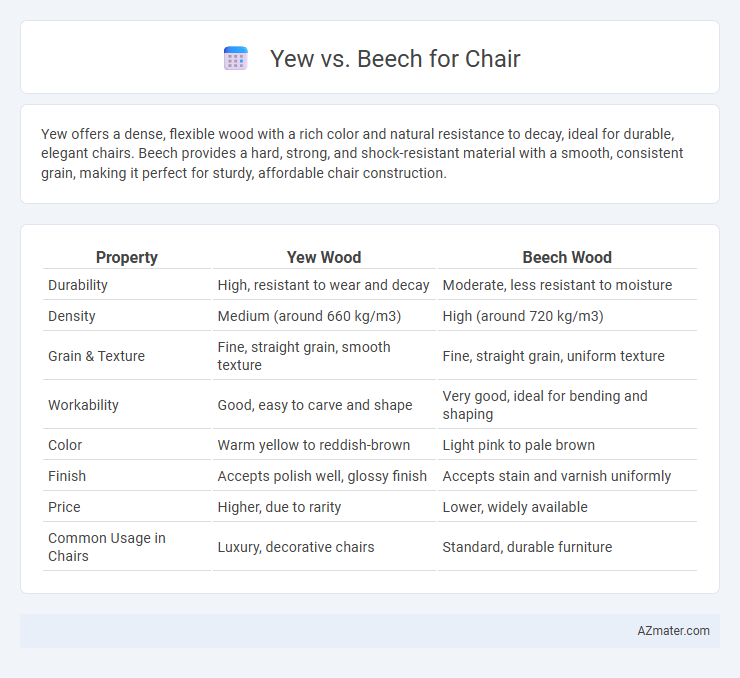Yew offers a dense, flexible wood with a rich color and natural resistance to decay, ideal for durable, elegant chairs. Beech provides a hard, strong, and shock-resistant material with a smooth, consistent grain, making it perfect for sturdy, affordable chair construction.
Table of Comparison
| Property | Yew Wood | Beech Wood |
|---|---|---|
| Durability | High, resistant to wear and decay | Moderate, less resistant to moisture |
| Density | Medium (around 660 kg/m3) | High (around 720 kg/m3) |
| Grain & Texture | Fine, straight grain, smooth texture | Fine, straight grain, uniform texture |
| Workability | Good, easy to carve and shape | Very good, ideal for bending and shaping |
| Color | Warm yellow to reddish-brown | Light pink to pale brown |
| Finish | Accepts polish well, glossy finish | Accepts stain and varnish uniformly |
| Price | Higher, due to rarity | Lower, widely available |
| Common Usage in Chairs | Luxury, decorative chairs | Standard, durable furniture |
Introduction to Yew and Beech Woods
Yew wood is prized for its rich reddish-brown hue, fine grain, and exceptional durability, making it an ideal choice for crafting elegant, long-lasting chairs. Beech wood offers a pale cream color with a smooth, uniform texture and is renowned for its strength and flexibility, providing sturdy yet comfortable seating options. Both woods are favored in furniture making, with yew prized for its aesthetic warmth and beech valued for its resilience and ease of handling.
Botanical Differences Between Yew and Beech
Yew (Taxus baccata) is an evergreen coniferous tree characterized by its needle-like leaves and red berry-like arils, while Beech (Fagus sylvatica) is a deciduous hardwood tree with broad, ovate leaves that turn golden in autumn. Yew wood is dense, elastic, and resistant to decay, derived from the slow-growing heartwood, whereas Beech wood is lighter, hard, and has a fine, tight grain suited for smooth finishes. Botanical differences such as leaf type, growth patterns, and wood density influence the choice between Yew and Beech for chair construction, affecting durability, aesthetics, and workability.
Strength and Durability Comparison
Yew wood offers exceptional strength with a high density of about 670 kg/m3, making it resistant to impact and ideal for sturdy chair frames. Beech wood, with a slightly higher density around 720 kg/m3, is known for its remarkable durability and resistance to wear, providing a solid foundation for long-lasting chairs. Both woods display excellent mechanical properties, but beech tends to resist deformation better under prolonged stress, enhancing its durability in everyday use.
Workability in Chair-Making
Yew wood offers exceptional workability for chair-making due to its fine grain and moderate hardness, allowing for precise carving and smooth finishes. Beech is highly favored for its uniform texture and excellent bending properties, making it ideal for shaping curved chair components without cracking. Both woods provide durability and stability, but beech is often preferred in mass production for its consistency and ease of machining.
Aesthetic Qualities and Grain Patterns
Yew wood offers a rich, reddish-brown hue with distinctive, irregular grain patterns that create a rustic yet refined aesthetic ideal for chairs emphasizing natural beauty. Beech wood features a light, creamy color with a fine, uniform grain, providing a smooth and contemporary appearance suited for minimalist and classic chair designs. Both woods exhibit unique visual textures; Yew's dynamic grain adds character and complexity, while Beech's consistent pattern ensures elegance and subtlety in furniture craftsmanship.
Weight and Density Considerations
Yew wood, known for its moderate density of approximately 650 kg/m3, offers a lightweight yet durable option for chair construction, making it easier to move and handle. Beech wood has a higher density, typically around 720 kg/m3, providing greater strength and stability but resulting in a heavier chair. When choosing between Yew and Beech for furniture, weight and density directly impact comfort, longevity, and portability of the chair.
Sustainability and Environmental Impact
Yew wood offers excellent durability and resistance to decay, making it a sustainable choice for chair manufacturing due to its long lifespan and slow growth rate, which supports carbon sequestration. Beech wood is prized for its fast growth and abundance, allowing for responsible forestry practices and lower environmental impact through efficient resource use and reduced deforestation pressure. Both woods contribute to eco-friendly furniture production, but yew's longer growth cycle emphasizes longevity, while beech's rapid replenishment highlights renewable sourcing.
Cost and Availability for Furniture Makers
Yew wood is generally more expensive and less readily available than beech, making it a premium choice for chair manufacturing. Beech is widely accessible, offering a cost-effective and abundant material favored by furniture makers for its consistent quality. The price difference largely stems from yew's slower growth and limited supply compared to the fast-growing, sustainable beech species.
Traditional and Modern Uses in Chairs
Yew wood, prized for its rich grain and natural resistance to moisture, is traditionally used in chair-making to create durable and elegant pieces with a classic appearance. Beech wood, favored in modern chair designs, offers exceptional strength and flexibility, making it ideal for mass production and ergonomic styles. Both woods balance aesthetic appeal and functionality, with yew often featured in antique or handcrafted chairs and beech dominating contemporary furnishings due to its cost-effectiveness and workability.
Choosing the Right Wood: Yew vs Beech for Chairs
Yew wood offers a rich, warm hue with natural resistance to moisture and decay, making it ideal for durable, elegant chairs that age beautifully. Beech is favored for its pale color, fine grain, and exceptional strength, providing a smooth finish and excellent stability under frequent use. Selecting between Yew and Beech depends on desired aesthetics, durability needs, and indoor environment, with Yew suited for statement pieces and Beech perfect for everyday comfort and robust functionality.

Infographic: Yew vs Beech for Chair
 azmater.com
azmater.com